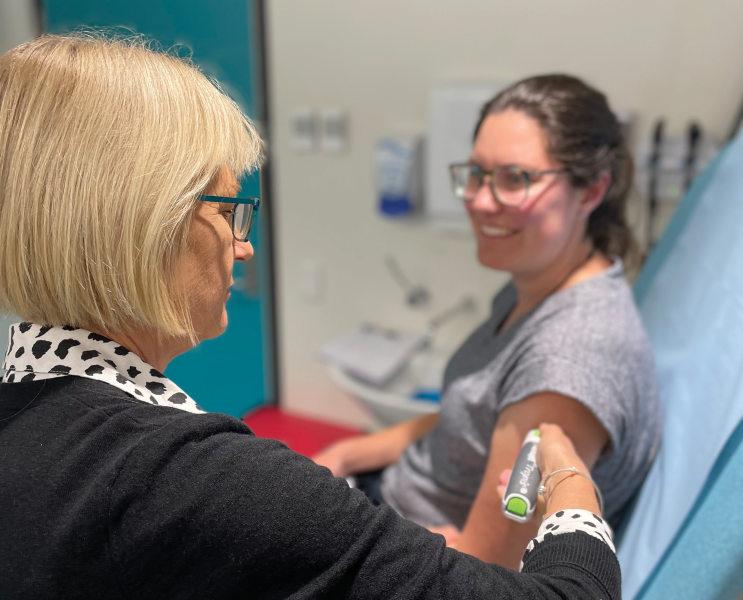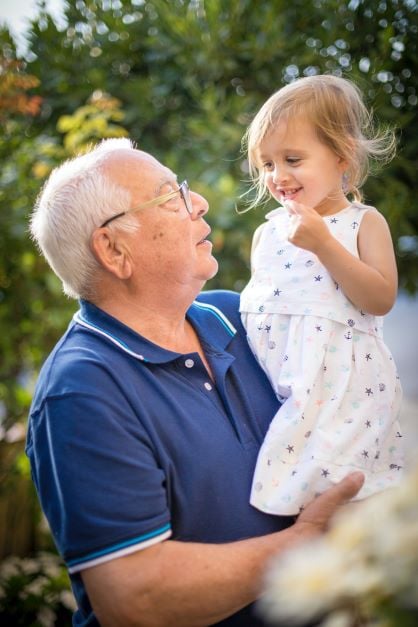Reduce impact on families
The research that is reducing the impact on families done by The Kids Research Institute Australia.

It’s not just those who contract COVID-19 that are suffering the devastating effects of this virus. It has affected every home in Australia, through unprecedented changes to our lives at home and work.
How can we reduce the impacts of this in the short and longer term?
COVALIA Booster Study
The Kids Research Institute Australia researchers are calling for participants for Australia’s first needle-free, gene-based COVID-19 vaccine study.
Led by The University of Sydney, The Kids Research Institute Australia is one of three locations chosen to participate in the COVALIA Booster Study evaluating the safety and effectiveness of the COVIGEN COVID-19 vaccine when given to healthy adults.
The COVIGEN vaccine uses a needle-free system that delivers genetic sequences of the COVID-19 spike protein through the skin to trigger an immune response. This technology is already being used for influenza vaccines in the USA and has been shown to be safe and stimulate protective antibodies.

Study researchers are currently seeking healthy adults aged 18 - 75 who have received their first two COVID-19 vaccines but have NOT received their booster dose.
Participants will be required to attend six clinic visits at Perth Children's Hospital and answer one phone survey.
If you would like to be involved in the COVALIA Study or would like more information, email vax4covid@telethonkids.org.au or call 0400 450 240.
PICOBOO COVID Study
Having your COVID-19 booster soon? Participate in the PICOBOO Study and you could play a role in shaping Australia's COVID-19 vaccine program.
The Platform Trial In COVID-19 Vaccine BOOsting (PICOBOO) Study is designed to evaluate the comparative effectiveness of COVID-19 booster vaccines.
The Kids Research Institute Australia researchers are working with study sites around Australia to see what effect COVID-19 booster vaccination has on the immune system, how long these effects last, and what the optimal booster strategies are for people living in Australia. The study will also explore the safety of booster vaccination and how well boosting protects against hospitalisation and disease.

Study researchers will be looking for fully vaccinated, healthy adults to take part in the PICOBOO Study prior to receiving their COVID-19 booster vaccine.
Registrations will be opening in February 2022 so please keep an eye out for more information soon.
Mental health and wellbeing: providing support and information for schools
This study will improve our understanding of the impact of COVID-19 isolation strategies to reduce transmission on school-age children’s mental health, wellbeing and school connectedness with the objective of providing recommendations to schools and families regarding key protective behaviours for wellbeing.
Mental illness and substance abuse disorders are amongst the highest contributors to the burden of disease for Australian adults, and many of these disorders first emerge in childhood or adolescence. The COVID-19 pandemic is already causing significant morbidity and mortality with resultant social and economic upheaval. There is genuine concern that as the pandemic takes hold in Australia there may be both immediate and long terms effects on mental health especially for children and youth directly impacted.
Status: Pending funding
Barriers and facilitators to the use of non-face-to-face mental health services during COVID-19
International data has demonstrated an increase in common mental health problems such as depression and anxiety since the emergence of the COVID-19 pandemic. Young people are particularly at risk of mental health difficulties in the current context. Compounding the uncertainty of these unprecedented times are the social distancing restrictions in place, which limit face-to-face access to mental health services.
The overarching aim of this research project is to better understand service provision, accessibility and engagement with non-face-to-face youth mental health services during the COVID-19 pandemic. Using online surveys, we will assess the experiences of three groups - young people, parents and carers of young people and youth mental health service providers – with a view to contributing to future service planning. The data will contribute to understanding how to best engage people in these alternative forms of mental health service, maximise adherence to treatments, and facilitate referrals and stepped care.
Status: Pending funding
Learning from the COVID-19 pandemic: evaluating virtual and digital models of care that have been rapidly implemented for chronic disease
The COVID-19 pandemic has resulted in a fast rollout of virtual and digital services to families accessing non-urgent services through Perth Children’s Hospital, including 1100 children with diabetes in WA. This has changed how the diabetes team offer consultations, providing an opportunity to investigate:
- how virtual and digital care is being implemented
- changes in the clinical outcomes of children with diabetes
- the mental health outcomes for these children, their families and clinicians and
- the barriers, facilitators, acceptability, accessibility and cost-benefit of providing virtual and digital care.
Researchers with expertise in diabetes, implementation science, psychology, dietetics and health economics have partnered with parents of children with diabetes to develop, lead, interpret and implement the findings of this project. These findings could be applied to a range of other chronic diseases in both the child and adult services in WA, informing effective approaches and enhancing health care delivery.
Status: Pending funding
ORIGINS community wellbeing during COVID-19
The ORIGINS Project is the largest study of its kind in Australia, following 10,000 pregnant women and their families over the next decade to improve child and adult health. The study recruits families whose babies are born at the Joondalup Health Campus.
The ORIGINS Project presents a unique opportunity to look at how a whole community is affected (not just those diagnosed with COVID-19) during this pandemic, in terms of their financial situation, family functioning and emotional wellbeing.
The Project team will be asking ORIGINS participants to complete questionnaires, additional to the core ORIGINS protocol; with a view to gathering data about families’ wellbeing, perceived stress, financial hardship and family functioning. This is unique and ground-breaking information/data that can then be shared nationally and internationally.
The data recorded during this project will be useful in planning essential support services for families during this time and following the pandemic. It is also anticipated that the information generated will be valuable in planning for future pandemics.
Status: Underway
COVID-19 in children with cancer
While information currently available shows that the COVID-19 infection is milder in children than in adults, children with a compromised immune system, like those with cancer, may have a higher risk of more severe infection.
Most children receiving chemotherapy do not have life threatening disease when they have other respiratory viruses such as influenza and we hope that this is also the case with COVID-19, but at this stage we do not have enough evidence to quantify the extent of the risk.
Currently, social distancing, good hand hygiene, avoiding anyone with flu-like symptoms and restricting visitors when in hospital are the best line of defence we have against COVID-19.
Developing a better understanding of the impact of COVID-19 on children with cancer is critical in ensuring the best clinical care for an already compromised and vulnerable group.
The The Kids Cancer Centre is part of national collaborations to understand the potential impact of the virus on vulnerable children and their families.
Alcohol and COVID—19: A dangerous combination
In the current environment with COVID-19 isolation there is emerging evidence of the increasing promotion of the use of alcohol during isolation, increasing online sales and increased use by many people at home. With increased stress from lack of employment, social isolation, home schooling and tensions within the house, agencies have reported an increase in domestic violence. These stressors are leading causes of women continuing to drink alcohol.
The FASD Hub at The Kids is partnering with Foundation for Alcohol Research and Education and NOFASD Australia over the next few months to provide clinically accurate information and awareness-raising activities to contribute to the reduction of alcohol consumption by women who are pregnant, may become pregnant, or are breastfeeding.
The health and wellbeing of staff working from home during COVID-19
Many people now find themselves involuntarily working from home. The Kids Research Institute Australia staff, students and volunteers are part of this group and are now embracing working from home as the ‘new normal’ for the foreseeable future. For some people, working from home allows them to balance paid work and family, whereas for others it can be an intrusion of work on home and family life, contributing to feelings of stress and isolation. But there may be members of our household that are helping to buffer these negative effects – our pets.
Pet ownership is associated with a number of physical, mental and social health benefits. Pets have also been shown to lower stress and loneliness in their owners. The aim of research is to understand how working-from-home impacts the social, emotional, mental and physical wellbeing of staff and, to examine the impact of pets on their working from home experience. The findings will help understand how people are managing working from home and how pets may be helping with this. Findings will be used to inform strategies for further supporting people working from home now during COVID-19 and in the future.
Status: Underway
How pets and being active are helping children through COVID-19
Young children are no exception when it comes to the importance of friendships and social interaction for maintaining good health and wellbeing. This COVID-19 research project involves surveying parents about how their young children are coping during this time of social distancing. We’re especially interested in understanding the roles played by pets and home-based active play in shaping developmental benefits such as improved self-esteem, self-regulation, empathy, autonomy and reduced stress levels. Our hope is to discover how we can provide the best support and guidance for WA families to protect and nurture young children’s physical and mental health and development.
Status: Underway
e-CARE: Mapping effectiveness and implementation of an online program to promote community resilience, wellbeing, and mental health
There is an urgent need to protect and promote the social and emotional wellbeing of the WA community, so that we can stay resilient now and in the future. This is a challenge, given current requirements for social distancing, the additional stress associated with COVID-19, and the existing strain on mental health services.
Our proposed solution involves the adaptation and delivery of an online wellbeing and resilience program (e-CARE) for adolescents (14-17) and adults (18+) in the general community. The online program has been previously successfully piloted, and an adapted version is currently being trialled with youth with chronic illness.
Our data indicates that participants in the current trial are using the program to manage COVID-19 related concerns, and we have had several requests to make e-CARE available and applicable to the general public. Our aim is to determine whether an adapted version of e-CARE is an effective, acceptable, and scalable resource for promoting wellbeing and resilience among adolescents and adults in the WA community.
CI: Amy Finlay-Jones
Other investigators: Professor Clare Rees (Curtin Uni), Professor Sally Brinkman (Fraser Mustard Centre, The Kids Research Institute Australia, University of Western Australia, University of Adelaide, Dr Mark Boyes (Curtin University), Associate Professor Jeneva Ohan (University of Western Australia), Professor Raghu LINGAM (University of New South Wales)
Status: Pending funding
